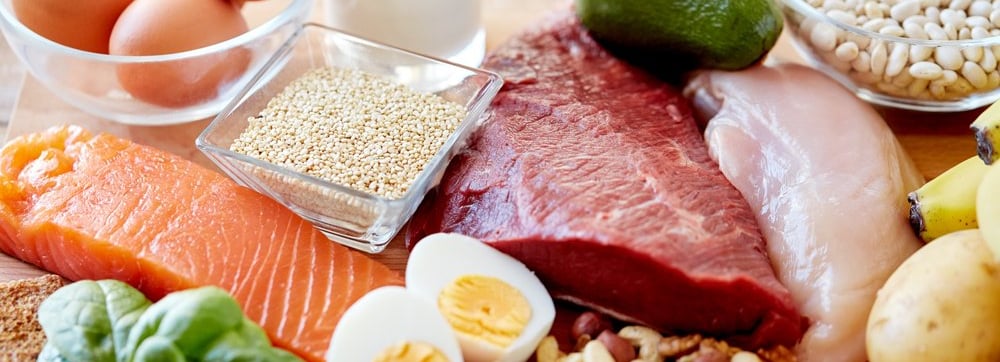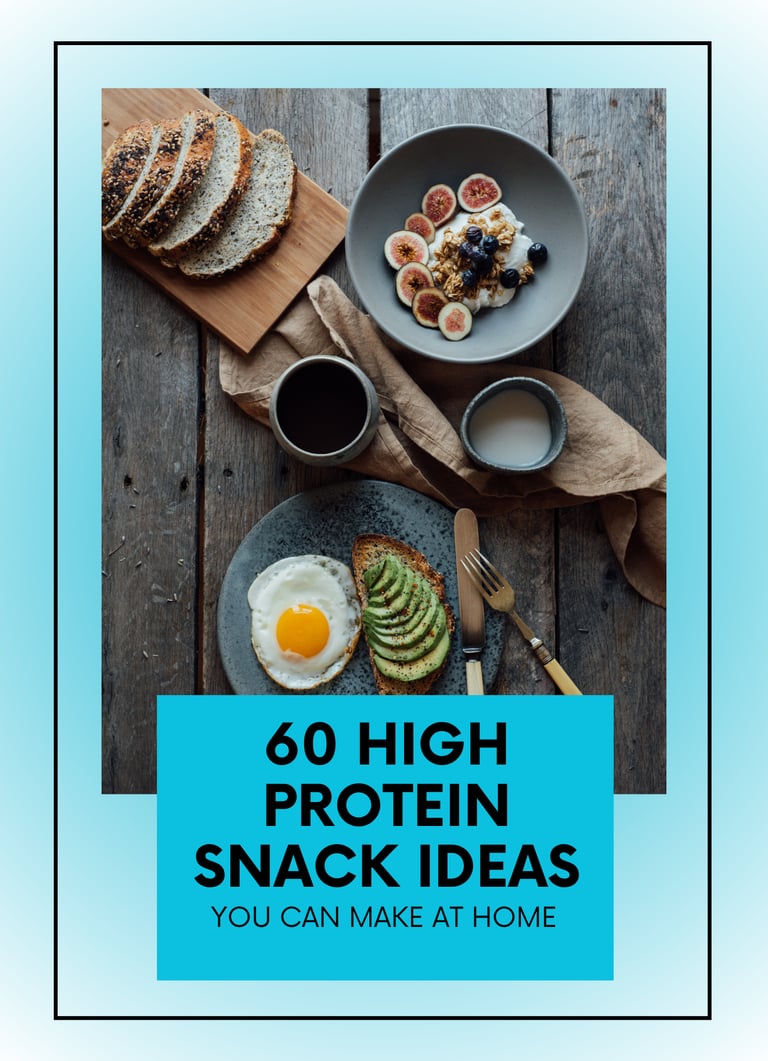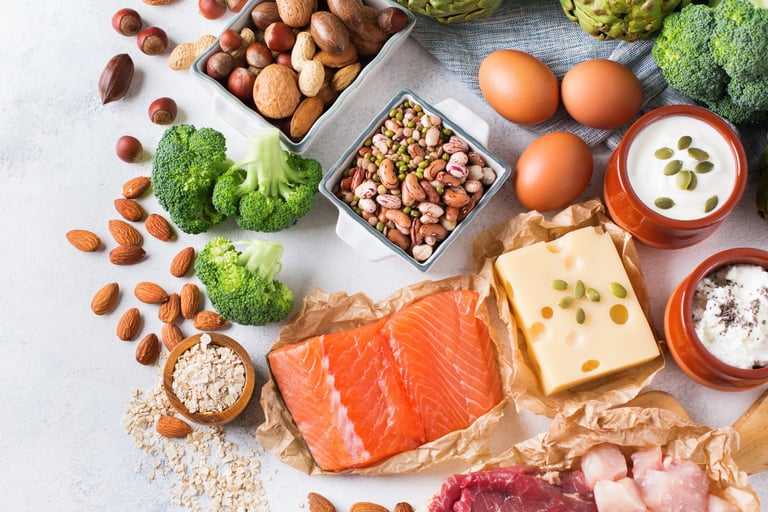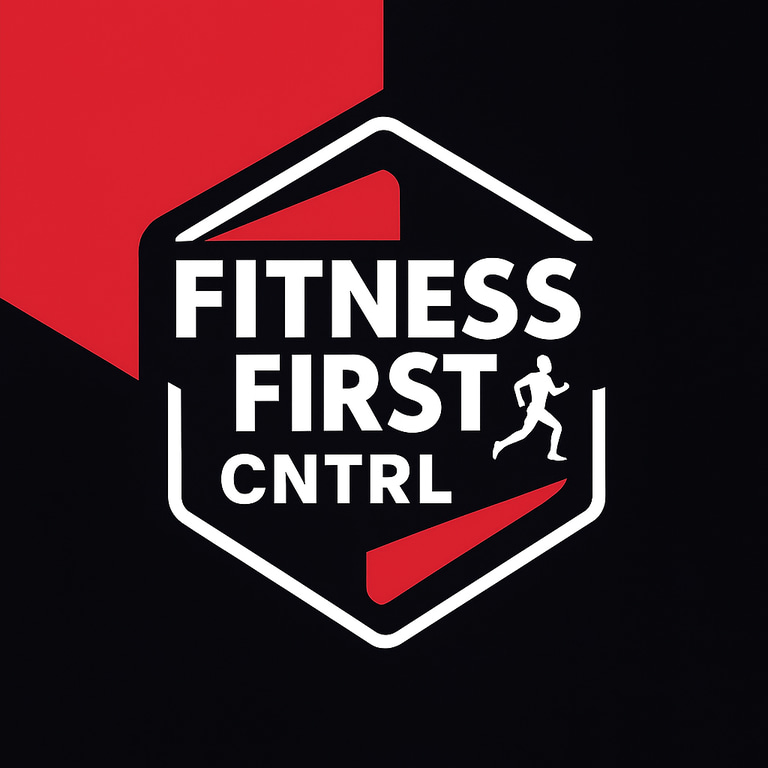USE CODE "fitnow" FOR 30% OFF your first purchase
Why Protein Is the Real Secret to Fat Loss (Not Just Calories)
Losing weight but not looking lean? Discover why protein is key to fat loss, how to preserve muscle, and grab 60 high-protein recipes—free download inside.
7/26/202510 min read


Maria stepped on the scale after 8 weeks of strict dieting and cardio. Down 15 pounds—she should have been celebrating.
Instead, she stared at her reflection feeling frustrated. Sure, the number was lower, but her arms looked smaller and weaker. Her stomach still had that soft, undefined look she was trying to lose.
"I'm lighter, but I don't look... fit," she confided to her friend. "I feel like I'm just a smaller version of my old self."
Sound familiar?
If you've ever felt like you're losing weight but not getting the lean, strong look you want, you're not alone. The harsh truth is that most people who focus only on cutting calories end up losing muscle along with fat—leaving them what fitness experts call "skinny fat."
But here's the game-changing question: Is it possible to lose fat without losing muscle?
The answer is absolutely yes. And the secret isn't found in fancy supplements or extreme workout routines.
It's protein.
Today, we're diving deep into why protein is the real MVP of fat loss - and how it can transform not just the number on your scale, but how you look and feel in your own skin.
Plus, I'll share my free collection of 60 high-protein recipes that make hitting your goals delicious and effortless.
What Really Happens During a Calorie Deficit (And Why Most People Get It Wrong)
Let's start with the basics. A calorie deficit simply means you're eating fewer calories than your body burns each day. When this happens, your body needs to find energy somewhere else and it starts breaking down stored tissue.
Here's where most people think the story ends: "Eat less, lose weight. Done."
But your body doesn't discriminate between fat and muscle when it's looking for energy. During a calorie deficit, you lose both fat AND muscle tissue—unless you give your body a reason to hold onto that muscle.
Think of it like this: Your body sees muscle as expensive real estate. It takes a lot of energy to maintain muscle tissue. So when calories get scarce, your body's first instinct is to downsize that expensive muscle "property" to save energy.
The result? You lose weight, but a significant portion comes from muscle - not just fat.
This is why so many people end up feeling weak, looking soft, and having a slower metabolism after their diet. They didn't just lose fat; they lost the very tissue that gives them shape, strength, and metabolic power.
Why Protein Is So Important in a Calorie Deficit
Protein isn't just another macronutrient—it's your muscle's bodyguard during fat loss.
Here's exactly how protein helps with fat loss:
1. Preserves Lean Muscle Mass
When you eat adequate protein during a calorie deficit, you're essentially sending your body a message: "Hey, we're still using this muscle tissue. Don't break it down for energy."
Research published in the American Journal of Clinical Nutrition shows that people who maintain high protein intake during weight loss retain significantly more muscle mass compared to those on low-protein diets.
The bottom line: More muscle preserved means you'll look leaner, stronger, and more defined as you lose weight.
2. Boosts Your Metabolism
Here's something most people don't know: protein has the highest thermic effect of all macronutrients.
This means your body burns more calories just digesting and processing protein compared to carbs or fats. In fact, about 20-30% of protein calories are burned during digestion, compared to only 5-10% for carbs and 0-5% for fats.
Translation: The more protein you eat, the more calories you burn throughout the day—even at rest.
3. Keeps You Fuller for Longer
Protein is the most satiating macronutrient, meaning it keeps you feeling satisfied longer than carbs or fats.
This isn't just willpower—it's biology. Protein triggers the release of hormones like GLP-1 and PYY that signal fullness to your brain. It also reduces levels of ghrelin, your hunger hormone.
The practical benefit: You're less likely to overeat or give in to cravings when your meals are protein-rich.
4. Prevents the "Skinny Fat" Look
Muscle is what gives your body shape, curves, and definition. Without adequate protein, you might lose weight but end up with that soft, undefined appearance that leaves you feeling frustrated despite the smaller number on the scale.
Protein ensures that as you lose weight, you're revealing lean muscle underneath—not just becoming a smaller version of your current shape.
5. Aids in Recovery and Performance
When you're in a calorie deficit, your body is under stress. Protein provides the building blocks (amino acids) your muscles need to recover from workouts and daily activities.
Better recovery means you can maintain your workout intensity, which further protects your muscle mass during fat loss.
What Happens If You Don't Eat Enough Protein While Dieting
Skipping adequate protein during fat loss isn't just ineffective—it can actually sabotage your results.
Here's what happens when you don't prioritize protein:
Muscle Loss in a Calorie Deficit Accelerates
Without enough protein, your body has no choice but to break down muscle tissue for energy. Studies show that people on low-protein diets can lose up to 25% of their weight from muscle mass.
That means if you lose 20 pounds, 5 pounds could be muscle—leaving you with less shape, strength, and metabolic power.
Your Metabolism Slows Down Dramatically
Muscle tissue burns calories 24/7, even when you're sleeping. When you lose muscle, your metabolic rate drops significantly.
This is why so many people experience rapid weight regain after their diet ends. Their metabolism has slowed down, but their appetite returns to normal levels.
Constant Hunger and Cravings
Low-protein diets leave you feeling hungry and unsatisfied, leading to:
Frequent snacking
Evening binges
Weekend "cheat days" that undo week's worth of progress
The mental exhaustion of constantly fighting cravings
Fatigue and Weakness
Protein deficiency during dieting often leads to:
Low energy levels
Difficulty completing workouts
Feeling weak or "shaky"
Brain fog and difficulty concentrating
Slower recovery from exercise
The "Skinny Fat" Appearance
This is the most frustrating outcome: losing weight but still feeling unhappy with how you look. Without muscle to provide shape and definition, you end up smaller but still soft and undefined.
How Much Protein Do You Actually Need When Cutting?
The standard dietary recommendation of 0.8g per kg of body weight? That's designed for sedentary people trying to prevent deficiency—not for people actively trying to lose fat while preserving muscle.
The Research-Backed Sweet Spot
For fat loss while preserving muscle, aim for 1.6-2.2 grams of protein per kilogram of body weight (or about 0.7-1g per pound).
Here's what that looks like in practice:
140 lb person: 98-140g protein daily
160 lb person: 112-160g protein daily
180 lb person: 126-180g protein daily
Debunking the "Too Much Protein" Myth
"Won't all that protein damage my kidneys?"
This is one of the most persistent nutrition myths. For healthy individuals, high protein intake is completely safe. The kidney damage concern comes from studies on people with existing kidney disease—not healthy dieters.
A comprehensive review in the Journal of the International Society of Sports Nutrition concluded that "there is no evidence that protein intakes in the range of 1.6-2.2g/kg body weight pose any health risks in healthy individuals."
When to Eat Your Protein
Timing matters, but not as much as total intake. Focus on getting some protein at each meal, with these guidelines:
Post-workout: 20-40g within 2 hours of training
Throughout the day: Spread intake across 3-4 meals for optimal muscle protein synthesis
Before bed: Including some protein can support overnight recovery
Easy High-Protein Meal Ideas for Fat Loss
Hitting your protein goals doesn't have to be complicated or boring. Here are simple, delicious ways to fuel your fat loss:
Quick Breakfast Options
Greek yogurt parfait: 1 cup Greek yogurt (20g) + berries + 1 tbsp almonds
Protein smoothie: Protein powder (25g) + spinach + banana + almond milk
Egg scramble: 3 whole eggs (18g) + vegetables + 1 slice whole grain toast
Satisfying Lunch Ideas
Chicken power bowl: 4oz grilled chicken (35g) + quinoa + roasted vegetables
Tuna salad wrap: 1 can tuna (25g) + avocado + whole wheat tortilla + greens
Cottage cheese bowl: 1 cup cottage cheese (25g) + cucumber + cherry tomatoes
Dinner Winners
Salmon with sweet potato: 5oz salmon (40g) + roasted sweet potato + steamed broccoli
Turkey meatballs: 4oz ground turkey (30g) formed into meatballs + marinara + zucchini noodles
Tofu stir-fry: 5oz firm tofu (20g) + mixed vegetables + brown rice
Smart Snack Options
Protein bars: Look for bars with 15-20g protein and minimal added sugar
Hard-boiled eggs: 2 eggs provide 12g protein
Edamame: 1 cup provides 17g plant-based protein
Pro Tips for Success
Make it sustainable: Choose protein sources you actually enjoy eating. The best diet is the one you can stick to long-term.
Prep in advance: Cook proteins in batches on weekends. Having cooked chicken, hard-boiled eggs, or prepared tofu on hand makes hitting your goals effortless.
Use your weight loss tracker: Monitor your protein intake alongside your weight loss progress. Many people are surprised to discover they're eating far less protein than they think.
The Protein-Powered Transformation: What to Expect
When you prioritize protein during your fat loss journey, here's what you can expect:
Week 1-2: Reduced Hunger
You'll notice feeling satisfied longer after meals and experiencing fewer cravings between eating.
Week 3-4: Better Energy
Stable blood sugar from protein helps maintain consistent energy levels throughout the day, making it easier to stick to your workout routine.
Week 6-8: Visible Changes
This is when people start noticing the difference. Your weight loss will be primarily fat, not muscle, so you'll look more toned and defined.
Month 2-3: Strength Maintenance
Unlike typical dieters who get weaker over time, you'll maintain or even gain strength thanks to preserved muscle mass.
Long-term: Sustainable Results
The muscle you preserve makes weight maintenance easier because your metabolism stays higher, and you're more likely to keep the weight off permanently.
Your Action Plan: Making Protein Work for You
Ready to harness the power of protein for your fat loss goals? Here's your step-by-step game plan:
Step 1: Calculate Your Target
Use the formula: Body weight in pounds × 0.7-1.0 = daily protein grams
Step 2: Track for One Week
Use a food diary or app to see how much protein you're currently eating. Most people are shocked to discover they're getting less than half their target amount.
Step 3: Plan Your Protein Sources
Choose 3-4 protein sources you enjoy and make sure you have them available throughout the week.
Step 4: Start Each Meal with Protein
Build your meals around your protein source first, then add vegetables, healthy fats, and carbs.
Step 5: Monitor Your Progress
Use your weight loss tracker to monitor both the scale and how you feel. Take progress photos and body measurements—the changes in body composition will be dramatic.
Does Protein Help You Lose Belly Fat?
This is one of the most common questions I get, and the answer is nuanced.
Protein doesn't specifically target belly fat—no food can spot-reduce fat from specific areas. However, protein supports belly fat loss in several important ways:
Higher protein intake helps reduce overall body fat percentage, and for many people, belly fat is the last to go. By preserving muscle mass throughout your fat loss journey, you'll maintain a higher metabolic rate, making it easier to reach the lower body fat percentages where belly fat disappears.
Additionally, protein helps reduce visceral fat—the dangerous fat around your organs—more effectively than low-protein diets, according to research published in Nutrition & Metabolism.
How to Maintain Muscle While Losing Weight: Your Complete Strategy
Protein is crucial, but it's not the only piece of the puzzle. Here's your complete strategy for maintaining muscle while losing weight:
The Foundation: Adequate Protein
As we've covered, aim for 0.7-1g per pound of body weight daily.
The Support: Strength Training
Resistance training 2-3 times per week signals your body to maintain muscle mass. You don't need to spend hours in the gym—even bodyweight exercises count.
The Timing: Moderate Deficits
Extreme calorie deficits increase muscle loss. Aim for a deficit of 300-500 calories per day for sustainable fat loss with muscle preservation.
The Recovery: Adequate Sleep
Poor sleep increases cortisol and reduces protein synthesis. Aim for 7-9 hours nightly to optimize your body's muscle-building processes.
Your Free 60-Recipe Protein Power Pack
If you've made it this far, chances are you're ready to fuel your fat loss with the power of protein—and I've made it incredibly easy for you.
I know that knowing what to do and actually doing it are two different things. That's why I've created something special: a collection of 60 high-protein recipes that make hitting your protein goals delicious, varied, and effortless.
Here's what you'll find inside:
Breakfast Champions (15 Recipes)
From protein-packed pancakes to savory egg dishes, start your day with recipes that keep you satisfied until lunch.
Lunch Legends (15 Recipes)
Quick, portable options perfect for meal prep or eating on-the-go without sacrificing your protein goals.
Dinner Superstars (15 Recipes)
Family-friendly meals that prove healthy eating doesn't have to be boring or complicated.
Snack Heroes (15 Recipes)
Smart snacks that actually contribute to your daily protein instead of derailing your progress.
Every recipe includes:
Complete nutrition information
Prep and cook times
Make-ahead instructions
Substitution suggestions for dietary restrictions
Whether you're a meal prep master or a kitchen newbie, whether you love meat or prefer plants, whether you're cooking for one or feeding a family—you'll find recipes that fit your lifestyle.
👉 Click here to download your free 60-recipe protein power pack
The Bottom Line: Protein Changes Everything
Here's what I want you to remember from this deep dive:
Weight loss isn't just about eating less—it's about eating smart. When you prioritize protein during your fat loss journey, you're not just losing weight. You're transforming your body composition, preserving your metabolism, and setting yourself up for long-term success.
The difference between someone who loses weight and keeps it off versus someone who yo-yo diets forever often comes down to one thing: whether they preserved their muscle mass during the process.
Protein is your insurance policy against the metabolic slowdown, muscle loss, and eventual weight regain that plague most dieters.
So yes, calories matter. But protein? Protein changes everything.
Your journey to a leaner, stronger, more confident you starts with your very next meal. Make it a protein-rich one.
Ready to dive deeper into your weight loss journey? Check out our complete weight loss tracking system that helps you monitor not just the scale, but your protein intake, energy levels, and body composition changes.
Want more evidence-based nutrition content? Read our guide on how to create a sustainable calorie deficit without losing muscle or explore the best exercises for preserving muscle during fat loss.
Remember: You don't have to choose between losing weight and looking strong. With the right approach, you can have both.






